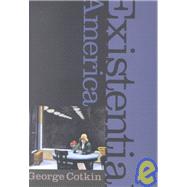
George Cotkin is a professor of history at California Polytechnic State University in San Luis Obispo. He is the author of Reluctant Modernism: American Thought and Culture, 1880--1900 and William James, Public Philosopher, the latter published by Johns Hopkins.
| Acknowledgments | ix | ||||
|
1 | (12) | |||
| 1741--1949 American Existentialists before the Fact | |||||
|
13 | (22) | |||
| 1928--1955 Kierkegaardian Moments | |||||
|
35 | (19) | |||
|
54 | (37) | |||
| 1944--1960 The Era of French Existentialism | |||||
|
91 | (14) | |||
|
105 | (29) | |||
|
134 | (27) | |||
| 1948--1968 Realizing an Existential Vision | |||||
|
161 | (23) | |||
|
184 | (26) | |||
|
210 |
The New copy of this book will include any supplemental materials advertised. Please check the title of the book to determine if it should include any access cards, study guides, lab manuals, CDs, etc.
The Used, Rental and eBook copies of this book are not guaranteed to include any supplemental materials. Typically, only the book itself is included. This is true even if the title states it includes any access cards, study guides, lab manuals, CDs, etc.